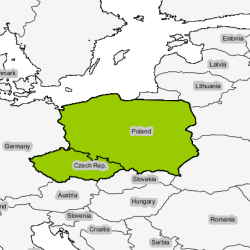Poland And The Czech Republic To Adopt iPoker Regulation Soon

Online poker markets across the European Union are set to get a major boost in player traffic after both the Czech Republic and Poland recently passed laws legalizing online poker, in the process increasing the EU’s overall regulated iPoker population pool by 50 million.
Poker in the Czech Republic
The Czech Republic has been considering legalizing online poker since 2014, and recently the country’s Finance Minister, Andrej Babiš, introduced a proposal to change the country’s gambling laws. One of the proposed changes includes allowing for regulated online poker, but at a very high rate of taxation, which Babiš said would help cover the indirect costs of gambling addiction that would inevitably rise post-legalization.
On June 10, Czech President Miloš Zeman subsequently signed a final bill into law reflecting the Finance Minister’s belief that online poker should be heavily taxed if properly regulated. As a result, operators will be required to pay 19 percent corporation tax, a 35 percent tax on gross gaming revenue and 23 percent on sports betting and lottery revenues. The Czech law also places strict restrictions on maximum bet limits, capping them at $41.45 for online poker cash games, and $2,072 for tournaments.
However, many people believe that the Czech regulations due to take affect on January 1st, 2017, will stifle any potential for online poker to be successful in the country. Online poker is unlikely to be very appealing to serious players due to the bet limits, and similarly recreational players may be too few to support sites, especially as shared player liquidity across EU countries will be restricted due to wagering caps. When you factor in the high cost of doing business for operators, the Czech online poker market doesn’t seem to be very lucrative, and it would be surprising if major operators started flocking to get licenses in the country.
Online Poker in Poland
Poland has also been working on reforming its gambling laws since 2014. The country previously passed a gambling law in 2011 legalizing online poker, but only for operators who were based inside Poland. As a result, illegal online poker sites remained commonplace in Poland, and the law seems to have been ignored by the government, players and foreign operators alike. Operators actually filed complaints with the European Union, stating that by preventing operators from EU nations from apply for licenses, they were breaking EU trade agreements. As Deputy Prime Minister Jaroslaw Gowin explained at the time:
“We want Poland in a sphere of normality and common sense. We want to move away from solutions that make 95% of betting a gray area.”
The legislation that is currently being worked on by the Polish legislature seeks to remedy the problem and bring Poland into compliance with EU trade agreements. While the bill has not been finalized, rumor has it that the final text will include a 20 percent tax on gross gaming revenue, and that it will legalize both online poker and slots with the option for European operators to apply for licensing.
With a population about equal to that of California and what seems to be more relaxed regulations, Poland is likely to be a more appealing market for operators than the Czech Republic. Still, the nominal gross domestic product per capita in the country is only $13,390, suggesting that Polish players may not have much disposable income to take to the virtual tables.
Furthermore, there are concerns that The Law and Justice Party, which last October won 51% of the seats in the Polish parliament, has not got the right approach to developing the country’s online poker industry, especially as it has also expressed an interest in considering establishing a ring-fenced market, headed by a state-run poker site. As Marcin Horecki, a Team PokerStars pro and member of Free Poker, explains:
“The problem is that the people in charge have no clue about poker. We started getting to know the previous members of parliament and they started getting a better understanding of the game.. But now we have new members of parliament that know nothing again. The Polish authorities that should be in charge have no clue. It’s not easy working for them. I’m afraid what might happen even in the next two months.”










